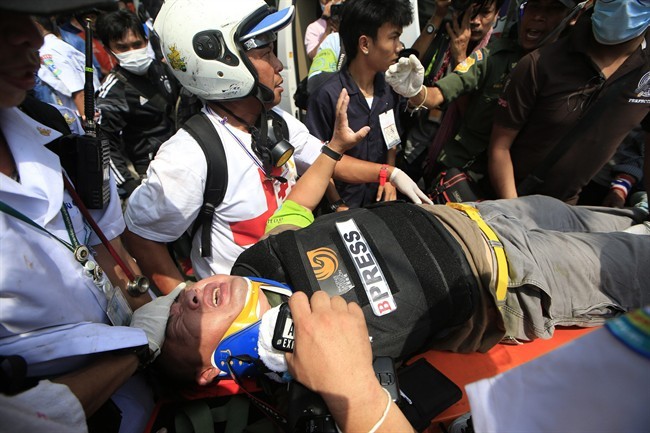BANGKOK – A Thai court ordered the government on Wednesday not to use force against protesters who are attempting to oust the prime minister, a day after violent clashes between riot police and demonstrators left five people dead and dozens injured.

The decision leaves beleaguered Prime Minister Yingluck Shinawatra with fewer options in dealing with the protesters, who have camped out for a month with virtual impunity in major intersections across the capital to press for her resignation.
She also faces a possible impeachment vote over accusations by the National Anti-Corruption Commission that she improperly handled an expensive rice subsidy program.
On Wednesday, thousands of protesters surrounded Yingluck’s temporary office in Bangkok’s northern outskirts to demand her resignation.
They asked officials at the Defence Ministry complex to prevent her from using it as her backup office. She has been unable to enter her regular office compound in downtown Bangkok because it is blocked by protesters and some gates have been cemented shut.
The Civil Court ruled Wednesday that some orders issued by the prime minister and a special security command centre under an emergency decree were illegal because they violate the protesters’ constitutional rights.

Get breaking National news
The prohibited orders include bans on gatherings of five or more people, on entering certain buildings, and on the use of certain roads. The court also prohibited the government from using any force.
The court, however, rejected a protester’s request that it revoke the state of emergency, saying it was within the executive branch’s power to enforce such a law.
- Heaviest snowfall in a decade possible as a winter storm blasts parts of the US
- Ukraine intensifies attack in Russia’s Kursk region
- Speculation grows that Austrian far-right leader Herbert Kickl will be asked to form a government
- New York City’s new congestion toll kicks in. What drivers need to know
The Cabinet declared a state of emergency in the Bangkok area on Jan. 21 after the protesters threatened to shut down the capital by blocking key intersections and occupying government offices.
Yingluck’s government, which is backed by many people in rural northern Thailand, has been attempting to avoid violence to keep the powerful military from stepping in. The country has been wracked by political unrest since 2006, when Yingluck’s brother, former Prime Minister Thaksin Shinawatra, was ousted by a military coup after being accused of corruption and abuse of power.
Police have been ordered to exercise restraint and avoid using force, but deadly gunbattles erupted Tuesday after they moved into several locations around the city to remove protesters.
Five people were killed and nearly 70 injured, according to Erawan emergency medical services.
The prime minister and Cabinet ministers stayed away from their temporary offices on Wednesday to prevent further tensions, the military said.
The demonstrators vowed to target businesses owned by Yingluck’s wealthy family.
“Wherever she is, wherever she sleeps, we will go after her,” protest leader Suthep Thaugsuban told supporters. “(We) must intensify our fight and we will attack Shinawatra businesses and their funding sources.”
The demonstrators, who mostly draw their support from the urban middle and upper class and people in the south, want Yingluck to step down to make way for an appointed interim government to implement reforms they say are necessary to fight corruption and remove the Shinawatra family’s influence from politics.
In its ruling, the Civil Court said the government’s orders were “violating and affecting the rights of the protesters under the constitution.”
It noted that Thailand’s constitutional Court earlier ruled that the protesters were rallying peacefully. It said the prime minister therefore “cannot use force or arms in cracking down” on them.
“When the facts show that there have been orders to bring a large number of police officers into Bangkok to crack down on the protesters, the court, therefore, is ruling to protect the protesters’ rights to rally peacefully and without arms,” it added.
It was unclear whether the ruling would affect arrest warrants issued for protest leaders for violating the state of emergency.







Comments